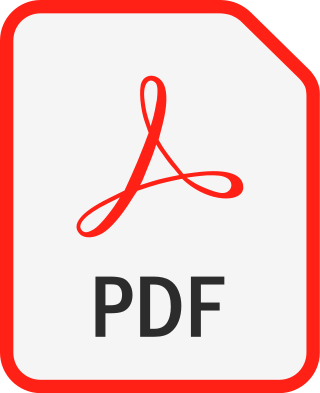
Portable Document Format (PDF), standardized as ISO 32000, is a file format developed by Adobe in 1992 to present documents, including text formatting and images, in a manner independent of application software, hardware, and operating systems. Based on the PostScript language, each PDF file encapsulates a complete description of a fixed-layout flat document, including the text, fonts, vector graphics, raster images and other information needed to display it. PDF has its roots in "The Camelot Project" initiated by Adobe co-founder John Warnock in 1991. PDF was standardized as ISO 32000 in 2008. The last edition as ISO 32000-2:2020 was published in December 2020.
The Rich Text Format is a proprietary document file format with published specification developed by Microsoft Corporation from 1987 until 2008 for cross-platform document interchange with Microsoft products. Prior to 2008, Microsoft published updated specifications for RTF with major revisions of Microsoft Word and Office versions.
DocBook is a semantic markup language for technical documentation. It was originally intended for writing technical documents related to computer hardware and software, but it can be used for any other sort of documentation.
XFA stands for XML Forms Architecture, a family of proprietary XML specifications that was suggested and developed by JetForm to enhance the processing of web forms. It can be also used in PDF files starting with the PDF 1.5 specification. The XFA specification is referenced as an external specification necessary for full application of the ISO 32000-1 specification. The XML Forms Architecture was not standardized as an ISO standard, and has been deprecated in PDF 2.0.

JSON is an open standard file format and data interchange format that uses human-readable text to store and transmit data objects consisting of attribute–value pairs and arrays. It is a commonly used data format with diverse uses in electronic data interchange, including that of web applications with servers.
XML Shareable Playlist Format (XSPF), pronounced spiff, is an XML-based playlist format for digital media, sponsored by the Xiph.Org Foundation.
The Extensible Metadata Platform (XMP) is an ISO standard, originally created by Adobe Systems Inc., for the creation, processing and interchange of standardized and custom metadata for digital documents and data sets.
An image file format is a file format for a digital image. There are many formats that can be used, such as JPEG, PNG, and GIF. Most formats up until 2022 were for storing 2D images, not 3D ones. The data stored in an image file format may be compressed or uncompressed. If the data is compressed, it may be done so using lossy compression or lossless compression. For graphic design applications, vector formats are often used. Some image file formats support transparency.
Open XML Paper Specification is an open specification for a page description language and a fixed-document format. Microsoft developed it as the XML Paper Specification (XPS). In June 2009, Ecma International adopted it as international standard ECMA-388.
AppImage is an open-source format for distributing portable software on Linux. It aims to allow the installation of binary software independently of specific Linux distributions, a concept often referred to as upstream packaging. As a result, one AppImage can be installed and run across Ubuntu, Arch Linux, and Red Hat Enterprise Linux without needing to use different files. It aims to be a format that's self-contained, rootless, and independent of the underlying Linux distribution.
This is an overview of software support for the OpenDocument format, an open document file format for saving and exchanging editable office documents.
In software engineering, a WAR file is a file used to distribute a collection of JAR-files, JavaServer Pages, Java Servlets, Java classes, XML files, tag libraries, static web pages and other resources that together constitute a web application.
Office Open XML is a zipped, XML-based file format developed by Microsoft for representing spreadsheets, charts, presentations and word processing documents. Ecma International standardized the initial version as ECMA-376. ISO and IEC standardized later versions as ISO/IEC 29500.
The following is a comparison of e-book formats used to create and publish e-books.
The Association of Software Professionals (ASP), formerly Association of Shareware Professionals, was a professional association for authors and developers of freeware, commercial, and shareware computer software. It was formed in April 1987, and for a time, it was considered as the most popular trade organization for independent software developers and vendors.

EPUB is an e-book file format that uses the ".epub" file extension. The term is short for electronic publication and is sometimes stylized as ePub. EPUB is supported by many e-readers, and compatible software is available for most smartphones, tablets, and computers. EPUB is a technical standard published by the International Digital Publishing Forum (IDPF). It became an official standard of the IDPF in September 2007, superseding the older Open eBook (OEB) standard.
In computing, Open Data Protocol (OData) is an open protocol that allows the creation and consumption of queryable and interoperable Web service APIs in a standard way. Microsoft initiated OData in 2007. Versions 1.0, 2.0, and 3.0 are released under the Microsoft Open Specification Promise. Version 4.0 was standardized at OASIS, with a release in March 2014. In April 2015 OASIS submitted OData v4 and OData JSON Format v4 to ISO/IEC JTC 1 for approval as an international standard. In December 2016, ISO/IEC published OData 4.0 Core as ISO/IEC 20802-1:2016 and the OData JSON Format as ISO/IEC 20802-2:2016.

Aptoide is an online marketplace for mobile applications which runs on the Android operating system. In Aptoide, unlike the Android-default Play Store, there is not a unique and centralized store; instead, each user manages their own store. The software package is published by Aptoide S.A., a for-profit company incorporated in 2011, and headquartered in Lisbon, Portugal.

BeerXML is a free, fully defined XML data description standard designed for the exchange of beer brewing recipes and other brewing data. Tables of recipes as well as other records such as hop schedules and malt bills can be represented using BeerXML for use by brewing software.


